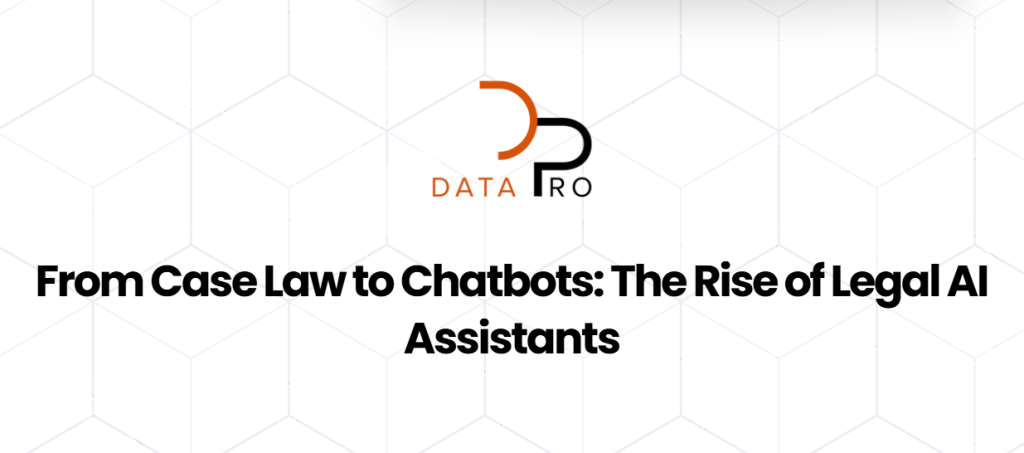
From Case Law to Chatbots: The Rise of Legal AI Assistants
The legal profession, once defined by stacks of casebooks, billable hours, and in-person consultations, is undergoing a radical transformation. At the forefront of this shift are Legal AI Assistants intelligent systems powered by artificial intelligence that are reshaping how legal services are delivered. From streamlining case research to offering real-time client support, these digital tools are revolutionizing the practice of law and expanding access to justice.
This article explores the rise of Legal AI Assistants, their current applications, the benefits they bring, and the challenges that come with integrating AI into a traditionally conservative field.
What Are Legal AI Assistants?
Legal AI Assistants are software tools powered by artificial intelligence technologies like natural language processing (NLP), machine learning (ML), and predictive analytics. Unlike general-purpose AI tools, these systems are specifically trained on legal datasets, statutes, case law, contracts, and court documents allowing them to understand legal language and deliver contextually relevant insights or actions.
Whether embedded in research platforms, contract review tools, or client-facing chatbots, Legal AI Assistants are designed to augment legal workflows by performing repetitive tasks, surfacing insights, and even simulating aspects of legal reasoning.
Core Applications of Legal AI Assistants
1. Legal Research and Case Law Discovery
Legal AI Assistants significantly reduce the time lawyers spend on case law analysis. Tools like Casetext’s CoCounsel and Lexis+ AI can interpret queries in plain English, search vast databases, and deliver curated case summaries almost instantly.
Unlike traditional keyword-based searches, these assistants understand the context and nuance of legal inquiries surfacing relevant precedents and statutory interpretations faster and with greater precision.
2. Automated Contract Review and Drafting
AI-powered contract assistants, such as those integrated into tools like Ironclad and LegalSifter, streamline contract lifecycle management. These systems can automatically review contracts, flag non-standard clauses, compare language against pre-approved templates, and even suggest alternative wording.
Some AI assistants now assist in contract drafting from scratch, taking user input and generating compliant, risk-mitigated drafts in minutes, drastically accelerating turnaround times for legal departments and law firms.
3. Virtual Legal Assistants and Chatbots
AI-driven chatbots like LawDroid, DoNotPay, and Ailira have made legal assistance more accessible by guiding users through tasks like filing small claims, drafting wills, or disputing parking tickets.
These assistants interact conversationally, often via web or mobile interfaces, offering legal guidance based on jurisdiction-specific regulations. They handle high volumes of repetitive queries, freeing up human lawyers to focus on more complex issues.
4. Litigation Support and Case Prediction
Using historical court data, Legal AI Assistants can help forecast the potential outcomes of litigation. Tools like Lex Machina or Blue J Legal use machine learning to assess how specific judges have ruled on similar cases, offering strategic insights for trial preparation.
By simulating litigation scenarios, these tools help lawyers evaluate the viability of a case, assess risk, and even recommend whether to settle or proceed.
5. Compliance Monitoring and Regulatory Updates
Staying ahead of changing regulations is a monumental task. Legal AI Assistants integrated into compliance platforms monitor updates from regulatory bodies, flag relevant changes, and provide summaries tailored to a company’s industry or risk profile.
This is especially valuable in highly regulated sectors such as finance, healthcare, and data privacy, where compliance failures can result in steep penalties.
Benefits of Legal AI Assistants
Increased Efficiency and Speed
AI Assistants handle tasks in seconds that would otherwise take hours accelerating legal research, contract review, and client communication.
Cost Reduction
By automating routine work, legal teams can reduce overhead costs, allowing law firms to serve more clients with fewer resources and offer more competitive pricing.
Improved Accuracy and Consistency
AI systems apply the same logic and review criteria consistently, minimizing human error and ensuring that no clause or case precedent is overlooked.
Greater Accessibility to Legal Services
Chatbot-based AI Assistants democratize legal help, offering low-cost or even free guidance to individuals who might otherwise forgo legal support altogether.
Data-Driven Insights
From case outcome prediction to contract risk scoring, AI delivers analytics that empower lawyers to make informed, strategic decisions backed by data.
Real-World Examples of Legal AI Assistants in Action
- DoNotPay bills itself as “the world’s first robot lawyer” and has helped millions of users contest traffic fines, cancel subscriptions, and more all through a simple chatbot interface.
- CoCounsel by Casetext, acquired by Thomson Reuters, uses OpenAI’s GPT technology to draft legal memos, review documents, and conduct deposition prep at a level that rivals junior associates.
- Harvey AI, used by elite law firms, offers a customizable AI legal assistant for contract review, legal research, and regulatory compliance, tailored to firm-specific needs.
These examples show that Legal AI Assistants are not future concepts; they’re already embedded in today’s legal workflows.
Challenges and Limitations
Ethical and Regulatory Concerns
Who is liable if an AI assistant gives incorrect advice? How can firms ensure transparency in AI-generated recommendations? These questions are driving the development of new ethical frameworks for AI in law.
Bias in Training Data
AI learns from historical legal data, which may carry inherent societal or judicial biases. If unchecked, these biases can perpetuate unfairness or skew predictions.
Data Privacy and Confidentiality
Legal data is highly sensitive, and any AI system must be designed with rigorous data protection protocols to ensure client confidentiality and compliance with laws like GDPR or HIPAA.
Resistance to Change
Many legal professionals remain cautious about adopting AI, citing fears of job displacement or concerns about reliability. However, early adopters are increasingly proving that AI is an enabler not a threat.
The Future of Legal AI Assistants
The next generation of Legal AI Assistants will be even more conversational, contextual, and personalized. They’ll integrate seamlessly across tools combining calendar management, client updates, case research, and task automation into one intelligent interface.
Anticipated Innovations:
- Multilingual Legal Support: AI assistants will break down language barriers in international legal matters.
- Voice-Activated Legal Counsel: Imagine asking your smart speaker for legal updates or advice tailored to your business.
- Autonomous Document Filing: AI tools will not just draft documents but file them directly with courts and agencies, reducing procedural errors.
As these tools evolve, their role will shift from reactive assistants to proactive collaborators flagging missed deadlines, suggesting litigation strategies, or even helping draft negotiation playbooks.
Human Lawyers Still Matter
Despite the rapid rise of Legal AI Assistants, they are not a replacement for human judgment, creativity, and empathy. Complex litigation, ethical dilemmas, nuanced negotiations, these are areas where human expertise remains irreplaceable.
The most successful legal professionals of the future will be those who know how to collaborate with AI, using it to enhance their practice, not replace it.
Conclusion
Legal AI Assistants are no longer just experimental tools; they are essential assets in the modern legal landscape. By enhancing efficiency, accessibility, and accuracy, they are reshaping the way legal services are delivered. While challenges around ethics, data privacy, and trust remain, the trajectory is clear: the future of law is augmented by AI.
Firms and legal professionals who embrace these technologies now will be better positioned to lead in a fast-changing industry. From case law to chatbots, the rise of Legal AI Assistants marks not the end of traditional law but the beginning of a smarter, more inclusive, and data-driven era.
Innovate With Custom AI Solution
- 12 Courtyard Pl,
Lexington, MA 02420 - (617)319-0174
- corp@dataprocorp.tech
